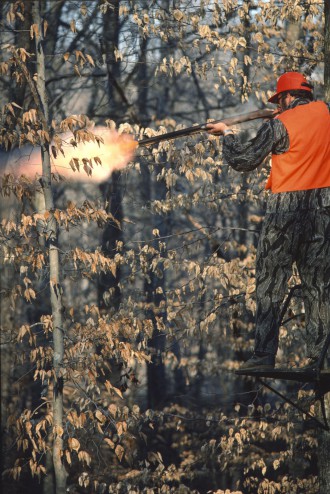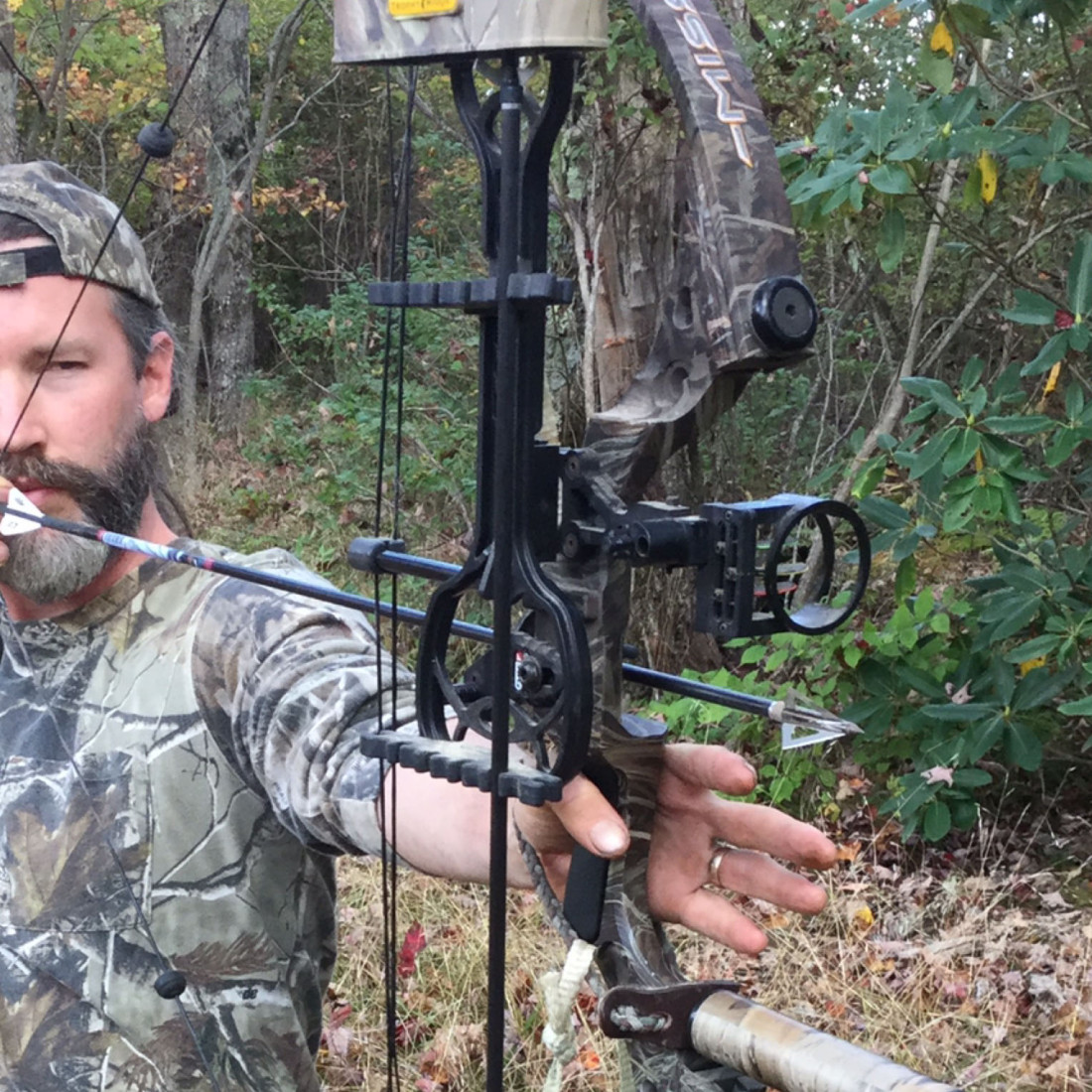Spencer Bolejack was exploring the woods with a friend when they heard a disembodied voice whisper, “Hey, boys.” They looked around, seeking the source of the sound, and the voice said, “Hey, boys,” again.
Spooked, the young Spencer and his friend squatted back to back, scanning their surroundings for any sign of movement. “It was creepy enough that I think we both pulled our knives out,” Bolejack recalls.
“Hey, boys!” the voice said, louder now — and, looking up, they spied a bowhunter perched directly above them in a tree, waiting for wild game to pass by. “Can y’all go somewhere else?” he asked.
That was a couple of decades ago, and today, Bolejack, a kind of Renaissance man in terms of wilderness pursuits, is a bowhunter himself. Now crowding 41, he hunts, makes his own knives, operates the Land of the Sky Wilderness School and even co-hosted a show on the Discovery Channel called “Hillbilly Blood.”
Hunting, notes Bolejack, plugs him directly into nature, requiring him to open his senses to the world in a way that makes him feel more alive.
“Life is so structured and conformed and safe and boring,” he says, “but to be out in the woods shooting a bow, you feel a little bit wild, you know? You feel a little free.”
Both bowhunting and black powder rifle hunting, another age-old practice that has a similar fascination for its aficionados, are regulated by the North Carolina Wildlife Resources Commission.
Burnsville resident David Miller, a North Carolina field representative for the National Muzzle Loading Rifle Association, bought his first muzzleloader when he was 10. The 80-year-old is still an active black powder hunter, and for a time, he even made his own powder. But Miller’s interest in the sport didn’t come from his family. “My father owned, in his life, two guns. I personally have 70-some in my collection right now.” About a third of them are muzzleloaders.
For love of the game
Hunting with a bow or a black powder rifle offers distinct advantages. Perhaps most importantly, traditionalist hunters get the first crack at game, and bowhunters enjoy a considerably longer season.

In Western North Carolina, this year’s bowhunting season for deer began Sept. 9 and will continue intermittently through Jan. 1; the brief black powder rifle season ran Oct. 2-14. For conventional firearms, the season will be Nov. 20-Dec. 9. Although the dates may change slightly from year to year, “The opening is the Saturday or Monday nearest some specified date,” deer biologist Jon Shaw of the Wildlife Resources Commission explains. “Currently, the Western gun and black powder seasons open on a Monday and close on a Saturday. Bow opens on a Saturday and closes Jan. 1.”
There’s a reason the bowhunting season starts first.
“It’s really a way that we can provide an opportunity for hunters to get out and hunt without having a big impact on the resource,” says Shaw. “Typically, bowhunter harvest rates are nowhere near what they are for black powder or firearm seasons.” Fewer hunters use bows, and they typically have to get much closer to their prey, which requires considerable skill.
Ideally, notes Shaw, most kills should come after the peak breeding season — early December in WNC — and should be scheduled in a way that keeps the population of male deer above an acceptable threshold.
“If you have a firearm season that opens up before peak breeding, generally hunters hunt a lot of antler bucks early in the season, and it leads to skewed adult sex ratios.” So when the females become receptive to mating, there may not be enough bucks left during the first mating cycle.
“The hormones that drive the cycle are triggered by day length, and each deer has its own clock ingrained in its DNA,” continues Shaw. “If a doe isn’t bred in her first cycle, she’ll come in a month later, and could come in as many as six to seven times in a single year.” But the problem, he explains, is that “Those does that aren’t bred in that first cycle tend to have fawns at a suboptimal time of year when environmental conditions aren’t favorable.” As a result, those fawns may take years to catch up with the ones born earlier in the season.
Concentrating the mating in the first cycle also means most does give birth around the same time, giving the newborn fawns a survival edge due to sheer force of numbers. “Theoretically, it could improve their chances of survival and eluding predators because you’ve flooded the market, so to speak, for those predators,” says Shaw.
This is important, he maintains, because the sex ratio is already “way out of line. In Western North Carolina, the way our seasons are currently structured, we harvest a lot of our bucks before that peak breeding period.”
To combat this, the Wildlife Resources Commission is considering new regulations for 2018 that would push WNC’s black powder deer season back by seven weeks and cut it to just seven days: Nov. 17-23. For conventional firearms, deer season would start about a week later but run three weeks longer than it does now: Nov. 24-Jan. 6.
Similar changes are being considered for other parts of the state. The agency will hold a series of public hearings on the proposed regulations in January; the District 9 hearing will be Tuesday, Jan. 16, at Haywood Community College, starting at 7 p.m.
Old sport
Hunting with a bow or a black powder rifle requires different tactics that may vary depending on the equipment used.
Bows, for example, come in several forms. Recurve bows are lightweight, making them easier to carry on extended treks. Compound bows are heavier but may be more reliable.
“I like both, but the fact of the matter is I can make a more accurate shot from a longer distance with this,” Bolejack explains, holding up a compound bow, “than with a primitive bow.”
Compound bows also have a mechanism that drastically reduces the “let-off” (the effort needed to keep an arrow notched and ready to shoot). “So you can track that deer if he’s behind a tree and just wait until he pops out, and really make a good shot.” Lacking that mechanism makes it harder to keep an arrow notched in a recurve bow for long periods of time.
Black powder firearms also have their own special quirks. Because the bullets have a lower velocity, says Miller, these weapons typically have a shorter range than a conventional high-powered rifle. To compensate for that, many black powder guns are longer and, thus, heavier. One of Miller’s has a 44-inch barrel.
In addition, bullets fired from a black powder rifle tend to deviate more from their intended path. “At 100 yards, a crosswind could affect it as much as 4 or 5 inches,” he says. “It might shoot that much to the left or the right, while with a modern rifle, it might be half an inch.”
Limited range also explains why bowhunters have to get close to their prey, which means they need to be silent — Bolejack recommends wearing moccasins or rubber-soled slippers — and aware of their own scent.
“One quick trick is to just get up in a tree,” he notes. “That’s why a lot of bowhunters shoot from up high: You can see more, and your scent is dispersed.”
Staying safe
Traditional hunters should, however, take extra care to avoid an unexpected tumble.
In North Carolina, most hunting accidents that lead to serious injury or death result from falling out of tree stands, which can be anywhere from 10-20 or more feet high, says Maj. Chris Huebner of the Wildlife Resources Commission’s law enforcement branch. During the 2016-17 hunting season, he notes, there were three fatalities in the state, all involving tree stands. “People often forget or don’t use a fall restraint system, which in most cases would have either reduced injury or prevented death,” says Huebner.
He also cautions hunters against leaving a tree stand up all year without replacing the straps. “Being out in weather often causes issues with those stands, and they fail.”
Bridging the divide
But as much as Bolejack loves hunting, he says he tries to avoid hikers and mountain bikers when he’s out in the woods. Some people get sensitive when they see a person out with a bow or a gun, he notes, and they can be squeamish about the idea of killing another living organism.
“Sometimes they flip out. Being a hunter, I know what it’s like to receive huge hostility in Asheville, and I also know what it’s like to receive huge hostility out in rural areas for having long hair or whatever.”
But at the same time, “There are a lot of us who are a bridge between cultures,” he points out. “That’s what the wilderness school is about; that’s what the TV show was about. That’s sort of my mission in life.”
Having grown up in Asheville, Bolejack knows the local culture well and says he’d like to see people get past the stereotypes about county versus city dwellers.
“I like it all,” he says. “I like going to Asheville — for a little while — and I like being out in the woods around a bonfire with a bunch of bearded mountain people. And everybody has something to learn and share.”



Before you comment
The comments section is here to provide a platform for civil dialogue on the issues we face together as a local community. Xpress is committed to offering this platform for all voices, but when the tone of the discussion gets nasty or strays off topic, we believe many people choose not to participate. Xpress editors are determined to moderate comments to ensure a constructive interchange is maintained. All comments judged not to be in keeping with the spirit of civil discourse will be removed and repeat violators will be banned. See here for our terms of service. Thank you for being part of this effort to promote respectful discussion.